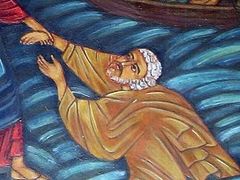And take heed to yourselves, lest at any time your hearts be
overcharged with surfeiting, and drunkenness…
Luke 21:34
Beloved brethren! It is soul-saving for us in these holy Forty Days not just to wear out our bodies with fasting, but also to talk about the fast; it is soul-saving for us in these holy Forty Days to turn all due attention to the caution against surfeit and satiety given us by the Lord Himself: Take heed to yourselves, He said, lest at any time your hearts be overcharged with surfeiting, and drunkenness.
The institution of the fast is a divine institution. The first commandment God gave to mankind is the commandment about fasting. It was necessary for us in paradise, before our fall, and it is even more necessary after the fall. The commandment about fasting given in paradise was repeated in the Gospel. Let us ascend in thought to the divine institution of fasting and be as if enlivened in soul by the contemplation of this institution, the very podvig of fasting.
The podvig of fasting does not belong exclusively to the body; the podvig of fasting is beneficial and needed not only for the body; it is beneficial mainly for the mind and heart. Take heed to yourselves, lest at any time your hearts be overcharged with surfeiting, and drunkenness. The Savior of the world revealed to us in these words that especially worthy of attention is that the consequences of consuming an excess of food and drink are terrible consequences, soul-destroying consequences. From pleasing the stomach the heart is burdened, made crude and hard; the mind is deprived of its lightness and spirituality; the man become fleshly. What does this mean, a “fleshly man”? The Holy Scripture calls fleshly that wretched man who is riveted to the earth, who is incapable of spiritual thinking and feelings. My spirit shall not always strive with man, for that he also is flesh (Gen. 6:3), did God testify. The fleshly man is incapable of worshiping God. Even a spiritual man who has been given over to satiety loses his spirituality, he loses as if the very ability to know God and serve Him. So Jacob ate, says Holy Scripture, having called Jacob a true servant of God, and was filled, and the beloved one kicked; he grew fat, he became thick and broad: then he forsook the God that made him, and departed from God his Saviour (Deut. 3:14). An ascetic comes to such a state when he excludes the podvig of fasting from his ascetic labors. The flabbiness and fogginess imparted to the body through abundance and indiscrimination in food is little-by-little imparted by the body to the heart, and from the heart to the mind. Then these eyes of the soul, the heart and mind, become dull; eternity hides itself from them; their sickened vision imagines earthly life to be endless. Man directs his earthly sojourn according to his understanding and feelings, and the wretched, bind wanderer goes on his belly, and eats dust of the earth all the days of his life (Gen. 3:14). Breaking the fast threatens the disciple of Christ with apostasy from Christ.
Such an influence of intemperate or even imprudent and incautious taking of food explains the reason why in the very state of his innocence, amidst the delights of paradise, man needed the commandment of fasting. It was provided in order to safeguard the newly created creature, a mingling of two natures—the physical and the spiritual—in a spiritual state; it was provided in order to balance the two natures and maintain the superiority of the spiritual nature. With its help, man was able to stand constantly in thought and heart before God; he was able to remain inaccessible to vain thoughts and fantasies.
All the more needed to fallen man is the commandment of fasting. An attachment to the earth, to this fleeting earthly life, to what is sweet, great, and glorious in it, to the very inclination toward sin became inherent to fallen nature, just as unruly cravings and feelings are inherent to the sickness that produces them. We are riveted to the earth, stuck to it with our whole souls and not only our bodies; We have become completely fleshly, deprived of spiritual sensations, incapable of contemplating the heavenly. The commandment of fasting is again our foremost and necessary commandment. Only with the help of fasting can we tear ourselves away from the earth; only with the help of fasting can we withstand the alluring power of earthly delights; only with the help of fasting can we rend our union with sin; only with the help of fasting can our spirit be freed from the onerous chains of the flesh; only with the help of fasting can our thoughts arise from the earth and gaze on high to God! To the measure that we place upon ourselves the good yoke of fasting will our spirit, which is akin to it, begin to turn often towards the contemplation of God, immerse itself in this immeasurable and wondrous contemplation and linger in it. If the objects of this material world illuminated by the rays of the material sun surely draw from it and radiate light, then how can our souls not become enlightened when, having thrown off by means of fasting the coarse and thick veil of fleshliness, stand directly before the Sun of Righteousness—God? The soul becomes enlightened; it is enlightened and changed! New, divine thoughts arise in it, and hitherto unknown mysteries are revealed to it. The heavens declare to it the glory of God (Ps. 18:2); the firmament showeth the omnipotence of the hands that created it; all creation visible and invisible loudly preaches the ineffable mercy of the Creator; it tastes of the spiritual and sees the spiritual, that the Lord is Good (Ps. 33:9). Grace-filled lightness and subtleness of spirit are imparted to the body; the body, following after the spirit, is drawn towards spiritual feelings and prefers the incorruptible food for which it was created over the corruptible food to which it had fallen. At first it with difficulty submits itself to the healing treatment and violence of fasting; at first it protests against the established fast, sets our spirit against it, takes up arms against it with various sophistries drawn from reason falsely so called. But being tamed and healed by fasting, it already begins to feel and reason differently. Its relationship to satiety are like the feelings that a convalescent has toward the harmful foods that he deliriously desired during his illness; its relationship to satiety is as to a discovered and now obvious poison, which seizes from the spirit its dominance over the flesh, and by which a man is cast down from his likeness and kinship to the angels to the likeness and kinship to irrational beasts. Spiritual warriors who have won victory over the flesh by means of fasting, having stood before the face of the Lord to learn the greatest mysteries and loftiest virtues, hear from His lips the teaching of the lofty virtue of fasting and the revelation of the mystery—of the state that gradually comes into being from surfeit and satiety: take heed to yourselves, lest at any time your hearts be overcharged with surfeiting, and drunkenness. The conquerors are reminded to scrupulously keep at hand their weapons with which they gained the victor! And both the victory is won, and the trophy gained through this victory is kept, using one and the same weapon—fasting.
The ascetic of Christ, illumined from on high and taught by his own pious experience, examining his own podvig of fasting, finds it necessary not only to restrain from a surfeit of foods and satiety, but also to be discriminating in the choice of food. This discrimination seems excessive only at a superficial, fleeting glance at oneself; but in essence the quality of food is very important. In paradise, only the quality of food was forbidden. In our vale of tears, on the earth, we find that indiscrimination in quality produces much greater problems for the soul than excess in quantity. We should not think that only a bunch of grapes can act upon our mind and soul; every kind of food has its own intrinsic effect on the blood, the brain, the whole body, and through the body—on the spirit. Whoever attentively guards himself, exercising himself in the podvig of fasting, will find it absolutely necessary to sober the body and soul from the constant ingestion of meats and fishes; he will lovingly venerate the rules of the holy Church on fasting and submit himself to them. The holy fathers called fasting the foundation of all the virtues, because fasting preserves our minds in the proper purity and sobriety, and our hearts in the proper subtleness and spirituality. Whoever shakes the foundation of the virtues shakes the whole edifice of the virtues.
Brethren! Let us pass the time of the holy fast with zeal and diligence. The depravation to which at first glance our bodies are subjected according to the rule of fasting are insignificant before the benefit to the soul that fasting can bring. By means of fasting let us detach our bodies from luxurious and rich tables, and our hearts from the earth and corruption, from that deep and destructive forgetfulness by which we separate ourselves from the eternity that awaits us and is ready to embrace us. Let us strive in soul and body to God! Let us fear the fleshly state produced by violating the fast, fear total incapability of worshipping and knowing God. This ruinous incapability manifests in us when from neglecting the divine commandment of fasting we allow our hearts to be overcharged with surfeiting, and drunkenness. Amen.




